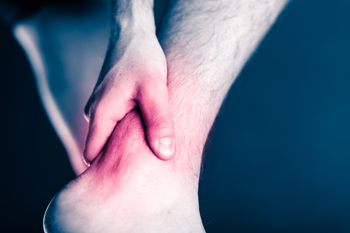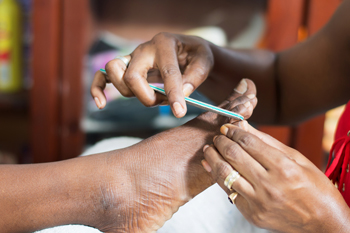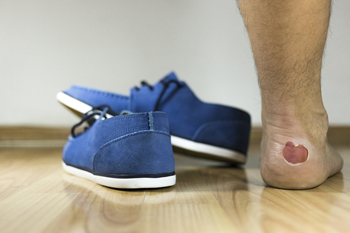Call us directly: (623) 328-8577
18731 N. Reems Road, Suite 640
Surprise, AZ 85374
View Location
Follow us on Facebook ![]()
December 2018
Causes of Achilles Tendon Injuries
 People who experience Achilles tendon injuries are typically involved in jumping and running activities. Additionally, this type of injury may occur as a result of suddenly tripping or falling from an extreme height. The function of the Achilles tendon is to connect the calf muscles to the heel area. If this should become torn, there typically are noticeable signs that an Achilles tendon rupture has occurred. These may include hearing a loud and popping noise, followed by severe pain and discomfort. A confirmation is typically needed to determine if an Achilles tendon injury has occurred, and this may be accomplished by having and MRI or ultrasound performed. If you have endured this type of injury, it is suggested that you seek the advice of a podiatrist who can determine what the best course of treatment is for you.
People who experience Achilles tendon injuries are typically involved in jumping and running activities. Additionally, this type of injury may occur as a result of suddenly tripping or falling from an extreme height. The function of the Achilles tendon is to connect the calf muscles to the heel area. If this should become torn, there typically are noticeable signs that an Achilles tendon rupture has occurred. These may include hearing a loud and popping noise, followed by severe pain and discomfort. A confirmation is typically needed to determine if an Achilles tendon injury has occurred, and this may be accomplished by having and MRI or ultrasound performed. If you have endured this type of injury, it is suggested that you seek the advice of a podiatrist who can determine what the best course of treatment is for you.
Achilles tendon injuries need immediate attention to avoid future complications. If you have any concerns, contact Dr. David K. Lee of Arches Foot Institute. Our doctor can provide the care you need to keep you pain-free and on your feet.
What Is the Achilles Tendon?
The Achilles tendon is a tendon that connects the lower leg muscles and calf to the heel of the foot. It is the strongest tendon in the human body and is essential for making movement possible. Because this tendon is such an integral part of the body, any injuries to it can create immense difficulties and should immediately be presented to a doctor.
What Are the symptoms of an Achilles Tendon Injury?
There are various types of injuries that can affect the Achilles tendon. The two most common injuries are Achilles tendinitis and ruptures of the tendon.
Achilles Tendinitis Symptoms
- Inflammation
- Dull to severe pain
- Increased blood flow to the tendon
- Thickening of the tendon
Rupture Symptoms
- Extreme pain and swelling in the foot
- Total immobility
Treatment and Prevention
Achilles tendon injuries are diagnosed by a thorough physical evaluation, which can include an MRI. Treatment involves rest, physical therapy, and in some cases, surgery. However, various preventative measures can be taken to avoid these injuries, such as:
- Thorough stretching of the tendon before and after exercise
- Strengthening exercises like calf raises, squats, leg curls, leg extensions, leg raises, lunges, and leg presses
If you have any questions please feel free to contact our office located in Surprise, AZ. We offer the newest diagnostic tools and technology to treat your foot and ankle needs.
Read more about What are Achilles Tendon InjuriesIt's Time for Beautiful Feet.
Flatter Arches May Be Indicative of Excess Weight Gain
 The feet bear the weight of the body. Uncomfortable and painful foot conditions may develop as a result of excess weight that is carried around. Many patients may find difficulty in maintaining a regular exercise program; this difficulty may be instrumental in gaining additional weight. This may be due to experiencing limited mobility, and losing the excess weight may prove to be challenging. The feet may change sizes, and you may notice the arch appearing flatter, in addition to the feet becoming wider. Some patients are familiar with arthritis that develops in the feet and ankles, which may be a side effect of increased weight gain. A specific type of arthritis that is known as gout may develop on the side of the big toe, which may be a result of ingesting unhealthy and fattening foods. If you have gained weight and are concerned about the health of your feet, it is suggested to speak with a podiatrist who can provide you with proper information.
The feet bear the weight of the body. Uncomfortable and painful foot conditions may develop as a result of excess weight that is carried around. Many patients may find difficulty in maintaining a regular exercise program; this difficulty may be instrumental in gaining additional weight. This may be due to experiencing limited mobility, and losing the excess weight may prove to be challenging. The feet may change sizes, and you may notice the arch appearing flatter, in addition to the feet becoming wider. Some patients are familiar with arthritis that develops in the feet and ankles, which may be a side effect of increased weight gain. A specific type of arthritis that is known as gout may develop on the side of the big toe, which may be a result of ingesting unhealthy and fattening foods. If you have gained weight and are concerned about the health of your feet, it is suggested to speak with a podiatrist who can provide you with proper information.
Obesity has become very problematic at this point in time and can have extremely negative effects on the feet. If you’re an obese individual and are concerned about your feet, contact Dr. David K. Lee from Arches Foot Institute. Our doctor can provide the care you need to keep you pain-free and on your feet.
Obesity and Your Feet
Since your feet are what support your entire weight when standing, any additional weight can result in pain and swelling. Being overweight is one of the main contributors to foot complications.
Problems & Complications
Extra Weight – Even putting on just a few extra pounds could create serious complications for your feet. As your weight increases, your balance and body will shift, creating new stresses on your feet. This uneven weight distribution can cause pain, even while doing the simplest tasks, such as walking.
Diabetes – People who are overweight are at serious risk of developing type-2 diabetes, which has a drastic impact on the health of your feet. As you get older, your diabetes might worsen, which could lead to loss of feeling in your feet, sores, and bruises. You could also become more prone to various infections.
Plantar fasciitis – Pressure and stress that is placed on muscles, joints, and tendons can trigger plantar fasciitis, which is an inflammation of tissue that forms along the bottom of the foot.
If you have any questions please feel free to contact our office located in Surprise, AZ. We offer the newest diagnostic and treatment technologies for all your foot and ankle needs.
Read more about How Obesity Affects Your FeetDaily Foot Inspections Are Necessary for Diabetic Feet
 If you are a diabetic patient, the importance of taking care of your feet is crucial in helping to maintain overall health. This can be accomplished by performing a daily inspection of your feet and noticing if there are any cuts, bruises or red areas that may be present. Additionally, it may be beneficial to avoid walking barefoot. Choosing shoes that fit properly and are comfortable helps as well. If you observe a cut on your foot, it may typically need attention as quickly as possible by washing it with soap and water, using a mild ointment if necessary, followed by covering it with a gauze bandage. If you are diabetic, it is suggested to be under the care of a podiatrist who can offer proper advice on how to take care of diabetic feet.
If you are a diabetic patient, the importance of taking care of your feet is crucial in helping to maintain overall health. This can be accomplished by performing a daily inspection of your feet and noticing if there are any cuts, bruises or red areas that may be present. Additionally, it may be beneficial to avoid walking barefoot. Choosing shoes that fit properly and are comfortable helps as well. If you observe a cut on your foot, it may typically need attention as quickly as possible by washing it with soap and water, using a mild ointment if necessary, followed by covering it with a gauze bandage. If you are diabetic, it is suggested to be under the care of a podiatrist who can offer proper advice on how to take care of diabetic feet.
Diabetic foot care is important in preventing foot ailments such as ulcers. If you are suffering from diabetes or have any other concerns about your feet, contact Dr. David K. Lee from Arches Foot Institute. Our doctor can provide the care you need to keep you pain-free and on your feet.
Diabetic Foot Care
Diabetes affects millions of people every year. The condition can damage blood vessels in many parts of the body, especially the feet. Because of this, taking care of your feet is essential if you have diabetes, and having a podiatrist help monitor your foot health is highly recommended.
The Importance of Caring for Your Feet
- Routinely inspect your feet for bruises or sores.
- Wear socks that fit your feet comfortably.
- Wear comfortable shoes that provide adequate support.
Patients with diabetes should have their doctor monitor their blood levels, as blood sugar levels play such a huge role in diabetic care. Monitoring these levels on a regular basis is highly advised.
It is always best to inform your healthcare professional of any concerns you may have regarding your feet, especially for diabetic patients. Early treatment and routine foot examinations are keys to maintaining proper health, especially because severe complications can arise if proper treatment is not applied.
If you have any questions please feel free to contact our office located in Surprise, AZ. We offer the newest diagnostic and treatment technologies for all your foot and ankle needs.
Read more about How to Care for Diabetic FootHeel Pain Can Be Treated!
Causes of Blisters
 If you notice a small area on your foot filled with fluid, you may have what is referred to as a blister. The fluid acts as a natural barrier that protects the new skin from any damage or injury that may occur. Friction is generally the main cause of blisters developing on the feet and may form as a result of wearing shoes that are too tight. Other causes of blisters may originate from an insect bite, or skin conditions that may include impetigo, chickenpox or a sunburn. Research has shown the importance of letting the blister drain on its own, and this may prevent an infection from developing. There may be ways to prevent blisters from forming, and these may include wearing footwear that fits properly, dusting your feet with powder, which may aid in absorbing excess sweat, or using sunscreen. Most blisters will heal on their own, but if you are experiencing a blister that keeps reoccurring or not healing properly, it is suggested to speak with podiatrist who can advise you on proper treatment and prevention techniques.
If you notice a small area on your foot filled with fluid, you may have what is referred to as a blister. The fluid acts as a natural barrier that protects the new skin from any damage or injury that may occur. Friction is generally the main cause of blisters developing on the feet and may form as a result of wearing shoes that are too tight. Other causes of blisters may originate from an insect bite, or skin conditions that may include impetigo, chickenpox or a sunburn. Research has shown the importance of letting the blister drain on its own, and this may prevent an infection from developing. There may be ways to prevent blisters from forming, and these may include wearing footwear that fits properly, dusting your feet with powder, which may aid in absorbing excess sweat, or using sunscreen. Most blisters will heal on their own, but if you are experiencing a blister that keeps reoccurring or not healing properly, it is suggested to speak with podiatrist who can advise you on proper treatment and prevention techniques.
Blisters are prone to making everyday activities extremely uncomfortable. If your feet are hurting, contact Dr. David K. Lee of Arches Foot Institute. Our doctor can provide the care you need to keep you pain-free and on your feet.
Foot Blisters
Foot blisters develop as a result of constantly wearing tight or ill-fitting footwear. This happens due to the constant rubbing from the shoe, which can often lead to pain.
What Are Foot Blisters?
A foot blister is a small fluid-filled pocket that forms on the upper-most layer of the skin. Blisters are filled with clear fluid and can lead to blood drainage or pus if the area becomes infected.
How Do Blisters Form?
Blisters on the feet are often the result of constant friction of skin and material, usually by shoe rubbing. Walking in sandals, boots, or shoes that don’t fit properly for long periods of time can result in a blister. Having consistent foot moisture and humidity can easily lead to blister formation.
Prevention & Treatment
It is important to properly care for the affected area in order to prevent infection and ease the pain. Do not lance the blister and use a Band-Aid to provide pain relief. Also, be sure to keep your feet dry and wear proper fitting shoes. If you see blood or pus in a blister, seek assistance from a podiatrist.
If you have any questions, please feel free to contact our office located in Surprise, AZ. We offer the newest diagnostic and treatment technologies for all your foot care needs.
Read more about Blisters on the Feet
(623) 328-8577
Arches Foot Institute
18731 N. Reems Road, Suite 640
Surprise, AZ 85374
© Arches Foot Institute | Cosmetic Foot Surgery | David Lee, DPM
Surprise Podiatrist | Surprise Podiatry | Surprise Foot Doctor



